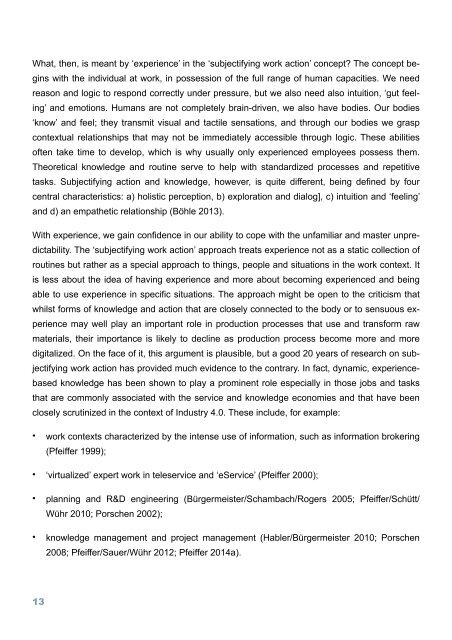DRAFT
237QXgQ
237QXgQ
Create successful ePaper yourself
Turn your PDF publications into a flip-book with our unique Google optimized e-Paper software.
What, then, is meant by ‘experience’ in the ‘subjectifying work action’ concept? The concept begins<br />
with the individual at work, in possession of the full range of human capacities. We need<br />
reason and logic to respond correctly under pressure, but we also need also intuition, ‘gut feeling’<br />
and emotions. Humans are not completely brain-driven, we also have bodies. Our bodies<br />
‘know’ and feel; they transmit visual and tactile sensations, and through our bodies we grasp<br />
contextual relationships that may not be immediately accessible through logic. These abilities<br />
often take time to develop, which is why usually only experienced employees possess them.<br />
Theoretical knowledge and routine serve to help with standardized processes and repetitive<br />
tasks. Subjectifying action and knowledge, however, is quite different, being defined by four<br />
central characteristics: a) holistic perception, b) exploration and dialog], c) intuition and ‘feeling’<br />
and d) an empathetic relationship (Böhle 2013).<br />
With experience, we gain confidence in our ability to cope with the unfamiliar and master unpredictability.<br />
The ‘subjectifying work action’ approach treats experience not as a static collection of<br />
routines but rather as a special approach to things, people and situations in the work context. It<br />
is less about the idea of having experience and more about becoming experienced and being<br />
able to use experience in specific situations. The approach might be open to the criticism that<br />
whilst forms of knowledge and action that are closely connected to the body or to sensuous experience<br />
may well play an important role in production processes that use and transform raw<br />
materials, their importance is likely to decline as production process become more and more<br />
digitalized. On the face of it, this argument is plausible, but a good 20 years of research on subjectifying<br />
work action has provided much evidence to the contrary. In fact, dynamic, experiencebased<br />
knowledge has been shown to play a prominent role especially in those jobs and tasks<br />
that are commonly associated with the service and knowledge economies and that have been<br />
closely scrutinized in the context of Industry 4.0. These include, for example:<br />
• work contexts characterized by the intense use of information, such as information brokering<br />
(Pfeiffer 1999);<br />
• ‘virtualized’ expert work in teleservice and ‘eService’ (Pfeiffer 2000);<br />
• planning and R&D engineering (Bürgermeister/Schambach/Rogers 2005; Pfeiffer/Schütt/<br />
Wühr 2010; Porschen 2002);<br />
• knowledge management and project management (Habler/Bürgermeister 2010; Porschen<br />
2008; Pfeiffer/Sauer/Wühr 2012; Pfeiffer 2014a).<br />
13


